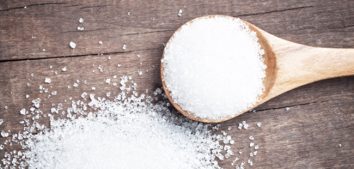
What determines our state of health? A brief conversation with a nutritionist Jacek Kucharski
I present to you a record of my brief conversation with Jack Kucharskim – Dietetic, with whom I work for several years.
Mr. Jacek takes care of athletes as well as people with health problems and those wishing to change their way of eating. He has enormous knowledge about healthy diet.
It’s worth reading!
A. What determines our health?
JK: The genes and lifestyles we lead decide our health. Although we have no impact on the genes we inherit and the state of our offspring genotype, we can improve these genes or spoil them by the lifestyle we lead.
Elements that define our way of life are: nutrition, physical activity and way of thinking. All three are equally important for health. We shouldn’t, for example, direct all attention to our training neglecting diet, workout and work on the psyche.
Deliberately I used here the word “nutrition” because it is the main reason for choosing your meals. Important are their nutritional value, not palatability (even healthy food can be very tasty). We eat to nourish the body, to give body the tools for the job, which is its complex functioning. Our life is a continuous biochemical reactions and, as in the chemistry of the components on one side and on the other side of the equation – they must match. The body must have a high quality fuel, so that the quality of our life was high. The body is a continuous square construction and reconstruction. All organs of the body except for the nervous and muscular systems are continuously exchanging, for example, taste buds-on the tongue exchange every 10 days, liver cells every 2 months, the skin every three months and bones every 5-6 years.
A: So, what we eat and how we eat, how we nourish our body has a tremendous impact on quality of our life?
JK: There are two basic aspects of proper nutrition.
The first is how to prepare meals, assembling products, the order of eating meals.
The body is always trying to gain from a meal all needed elements and if we eat the wrong way (wrong order, bad connection, bad preparation), it loses a lot of energy to convert food to fuel. Thus, for example, drowsiness after badly made-or too hearty dinner. The meal should give us energy instead of taking it away. Energy comes mainly from the liver, so if we charge it with bad quality food it takes a lot of energy. The liver is one of the most important organs in our body and must care for it and not disturb it in the recovery. Liver, when it has appropriate conditions, regenerates very quickly.
The basis of this process are: normal synthesis of collagen, an appropriate amount of silicon and other minerals and vitamins that are responsible for the synthesis of collagen; the corresponding content in the diet of butter and properly functioning thyroid gland, which oversees every process of regeneration. If we eat wrong way, we spoil our intestines, because digestive disorder at any gastrointestinal tract causes the food reaches the intestines not digested. It causes the decay and fermentation result in liver load, change of good bacterial flora, spoiling the walls of the intestines and intestinal villi. One small mistake does not create the problem, but to repeat it consistently, over a long period, may cause very large changes in the guts. The correct way of eating is the foundation of any changes in your diet.
The second aspect is a matter of quality food.
In the past, people had more exercise and less stress. Today, physical activity is kept to a minimum, and the level of stress we have is very high. We eat more and worse than ever. Changes in the forms of food going in completely the opposite direction than the body’s requirement of modern man. Mass production focused on quantity, not quality, processing and cleaning products makes food without it’s necessary composition. A lot of minerals and vitamins are lost through the purification of flour, rice and sugar (the B vitamins, zinc, magnesium, selenium, chromium, iodine). That’s why, even varied diet cannot adequately nourish our body. An effective solution is supplementation. Properly selected and based on natural products can complement deficiencies, particularly for people who lead busy lives (such as athletes), and in need of minerals, vitamins, proteins, healthy fats and far more than the average man.
A. And how important is physical activity in our lives?
JK: Physical activity is important for many reasons:
- It has a very large impact on the development of the nervous system of children, young people and the functioning of the nervous system in adults.
- Increases blood circulation, which actually nourishes and oxygenates tissues.
- Exercise is the only way of nourishing blood vessels tissue (eg cartilage in the joints).
- Work is the only muscle activator of movement of lymph, which increases the effectiveness of treatment and significantly increases the body’s resistance (moving intruders to the lymph nodes where they are destroyed)
Proper and systematic physical activity is simply basic for good health.
A.: And how important is our attitude, positive thinking?
JK: Good thinking, positive attitude to what we do, smile, throwing away bad thoughts from your head like anger or envy – all this is very important for health. Unfortunately, sometimes we forget that. We do not know how to forgive, how to enjoy the beauty of music, nature ….
You will live the way you program your computer – your brain, either positively or plunging in negativity and sometimes even disease.
Once again: it is very harmonious interaction of the three pillars of health that I mentioned at the beginning of our conversation. Well-nourished nervous system working properly, it supports the movement, and the brain motivates us to do that we want. And so closes the circle of our health …








Comment
0